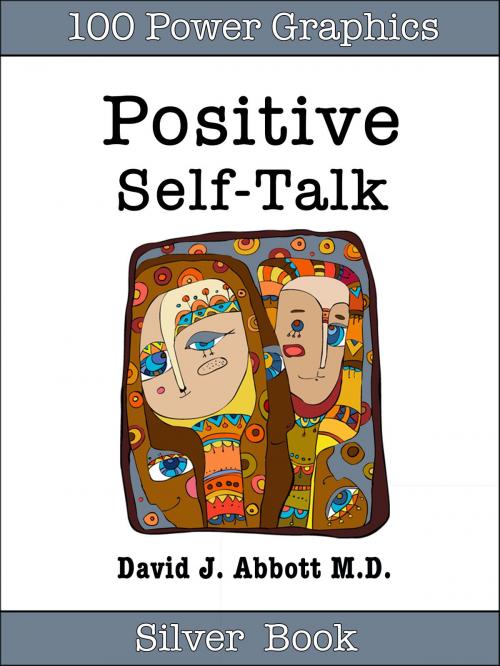Positive Self-Talk Silver Book
Nonfiction, Health & Well Being, Self Help, Self Improvement, Affirmations, Success, Motivational| Author: | David Abbott | ISBN: | 9781940109114 |
| Publisher: | Positive Thinking Network LLC | Publication: | December 17, 2014 |
| Imprint: | Language: | English |
| Author: | David Abbott |
| ISBN: | 9781940109114 |
| Publisher: | Positive Thinking Network LLC |
| Publication: | December 17, 2014 |
| Imprint: | |
| Language: | English |
You can change who you are by changing what you say when you talk to your mind. Just be sure you are speaking in a language that your mind understands.
In my work as a flying doctor, I examine patients on Indian reservations in the American southwest. When I speak to them in English, sometimes they don’t understand a word I say. The reason is because they speak the Apache language, and unfortunately, I don’t speak Apache. Although I can communicate in Arabic, French, Spanish, and English, it doesn’t matter how many languages I speak, if I don’t speak the right language, no communication occurs. The same is true with your mind.
Your brain speaks to you in its own language, and if you speak to it in the same way, it immediately responds in a powerful fashion. That’s why change proceeds most rapidly when you talk to yourself using the language of the mind.
Too many people talk to their brain using a language it does not understand. If you don’t speak the language of the mind, you may as well stop talking until you learn it.
The three most powerful components of the language of the mind are images, sounds, and emotions.
Take a minute and listen to the thoughts running through your mind. What do you hear?
When I do this exercise, I see pictures of my dreams on the motion picture screen of my mind. I hear the sound of my dreams, and I feel their motivating power. The torrent of sounds, pictures, and emotions are nothing less than the language of the mind in all its power and glory. That is exactly what happens when my brain talks to me about my dreams.
When my brain wants to get my attention, it does not send a text or an email. It blows me away with sights, sounds, and emotions. If you want to get your brain’s attention, you need to do the same thing. Send a message full of sights, sounds, and emotions. Start speaking the language that your mind understands.
The language of the mind is not a mystery. For all practical purposes, it consists of visual and auditory inputs mixed with a variable amount of emotional glue. Strong auditory and visual inputs in combination with compelling emotion pass straight into your mind.
The senses of hearing and vision are the powerhouses of this language.
Your eyes are actually part of your brain. The neural tissue of the retina is an extension of the brain. Embryologically, it develops as an outward extension from the brain. The eye is the most efficient sensory organ for rapidly transferring enormous amounts of data into the mind. The sense of hearing is also an efficient pathway for transmitting large amounts of information.
Emotions are the glue of the central nervous system. Emotions make auditory and visual information stick. When visual and auditory inputs are mixed with powerful emotion, that information instantly goes into your memory banks where it remains forever.
Not only does that information go directly into your mind, it goes in uncensored. The media utilizes this property to fill your mind with all sorts of sounds, images, and emotions many of which are unhealthy and unworthy to be in your mind. It would be great if you could apply a filter to the information before it gets inside, but you can’t. Censorship only occurs after the information is embedded in your memory banks. That is why violence and profanity on television are so undesirable. Censorship of garbage occurs after it has already gotten inside. You then face the unpleasant task of removing it, which is easier said than done. Such is the power of the language of the mind.
You can change who you are by changing what you say when you talk to your mind. Just be sure you are speaking in a language that your mind understands.
In my work as a flying doctor, I examine patients on Indian reservations in the American southwest. When I speak to them in English, sometimes they don’t understand a word I say. The reason is because they speak the Apache language, and unfortunately, I don’t speak Apache. Although I can communicate in Arabic, French, Spanish, and English, it doesn’t matter how many languages I speak, if I don’t speak the right language, no communication occurs. The same is true with your mind.
Your brain speaks to you in its own language, and if you speak to it in the same way, it immediately responds in a powerful fashion. That’s why change proceeds most rapidly when you talk to yourself using the language of the mind.
Too many people talk to their brain using a language it does not understand. If you don’t speak the language of the mind, you may as well stop talking until you learn it.
The three most powerful components of the language of the mind are images, sounds, and emotions.
Take a minute and listen to the thoughts running through your mind. What do you hear?
When I do this exercise, I see pictures of my dreams on the motion picture screen of my mind. I hear the sound of my dreams, and I feel their motivating power. The torrent of sounds, pictures, and emotions are nothing less than the language of the mind in all its power and glory. That is exactly what happens when my brain talks to me about my dreams.
When my brain wants to get my attention, it does not send a text or an email. It blows me away with sights, sounds, and emotions. If you want to get your brain’s attention, you need to do the same thing. Send a message full of sights, sounds, and emotions. Start speaking the language that your mind understands.
The language of the mind is not a mystery. For all practical purposes, it consists of visual and auditory inputs mixed with a variable amount of emotional glue. Strong auditory and visual inputs in combination with compelling emotion pass straight into your mind.
The senses of hearing and vision are the powerhouses of this language.
Your eyes are actually part of your brain. The neural tissue of the retina is an extension of the brain. Embryologically, it develops as an outward extension from the brain. The eye is the most efficient sensory organ for rapidly transferring enormous amounts of data into the mind. The sense of hearing is also an efficient pathway for transmitting large amounts of information.
Emotions are the glue of the central nervous system. Emotions make auditory and visual information stick. When visual and auditory inputs are mixed with powerful emotion, that information instantly goes into your memory banks where it remains forever.
Not only does that information go directly into your mind, it goes in uncensored. The media utilizes this property to fill your mind with all sorts of sounds, images, and emotions many of which are unhealthy and unworthy to be in your mind. It would be great if you could apply a filter to the information before it gets inside, but you can’t. Censorship only occurs after the information is embedded in your memory banks. That is why violence and profanity on television are so undesirable. Censorship of garbage occurs after it has already gotten inside. You then face the unpleasant task of removing it, which is easier said than done. Such is the power of the language of the mind.















